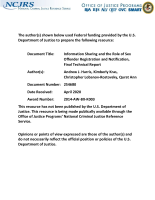Sex offenders
Information Sharing and the Role of Sex Offender Registration and Notification, Executive Report
TECHBeat, July/August 2019
Development and Validation of an Actuarial Risk Assessment Tool for Juveniles with a History of Sexual Offending
State Responses to Mass Incarceration
Researchers have devoted considerable attention to mass incarceration, specifically its magnitude, costs, and collateral consequences. In the face of economic constraints, strategies to reduce correctional populations while maintaining public safety are becoming a fiscal necessity. This panel will present strategies that states have undertaken to reduce incarceration rates while balancing taxpayer costs with ensuring public safety.
See the YouTube Terms of Service and Google Privacy Policy
Solutions in Corrections: Using Evidence-based Knowledge
Professor Ed Latessa describes how his team and he assessed more than 550 programs and saw the best and the worst. Professor Latessa shared his lessons learned and examples of states that are trying to use evidence-based knowledge to improve correctional programs.
See the YouTube Terms of Service and Google Privacy Policy
Going Home (or Not): How Residential Change Might Help the Formerly Incarcerated Stay Out of Prison
Dr. Kirk discusses how Hurricane Katrina affected those formerly incarcerated persons originally from New Orleans and their likelihood of returning to prison. Kirk also discussed potential strategies for fostering residential change among those who were incarcerated, focusing specifically on parole residency policies and the provision of public housing vouchers.
See the YouTube Terms of Service and Google Privacy Policy
Alternative Sentencing Policies for Drug Offenders
The panel presentations from the 2009 NIJ Conference are based on an NIJ-sponsored evaluation of the effectiveness of Kansas Senate Bill 123, which mandates community-based drug abuse treatment for drug possession by nonviolent offenders in lieu of prison.
Using License Plate Readers to Fight Crime
This is a joint panel of NIJ's Office of Research and Evaluation (ORE ) and Office of Science and Technology (OST). Panelists will discuss the latest efforts to implement license plate reader technology into policing operations. OST grantees will explain various aspects of the technology and an ORE grantee from the National Opinion Research Center will present findings from a study on the use of license plate readers to combat auto theft in Arizona.
An Examination of Justice Reinvestment and Its Impact on Two States
Funded in part by the Bureau of Justice Assistance and the Pew Center on the States, the justice reinvestment project is a data-driven strategy aimed at policymakers to "reduce spending on corrections, increase public safety and improve conditions in the neighborhoods to which most people released from prison return." Representatives from two states where the justice reinvestment strategy is currently being implemented will discuss how it is being used to reduce the rate of incarceration and how states can reinvest in local communities.
Sexual Violence Research 15 Years After VAWA
Panelists will summarize the progress and results of sexual violence research since the passage of the Violence Against Women Act of 1994. The panel will also examine how research has contributed to policy, assess current knowledge gaps and discuss research needs.
What Works in Probation and Parole
How can we prevent reoffending and reduce costs? Research points to a number of solutions. At the Tuesday plenary, Judge Steven Alm from Hawaii will describe his successes with hard-core drug offenders. “Swift and sure” is his motto. West Virginia Cabinet Secretary James W. Spears will discuss the issues from his state's perspective, and Adam Gelb, Director of the Pew Charitable Trust's Public Safety Performance Project, will lend a national overview.
What Works in Offender Supervision - Panel at the 2009 NIJ Conference
This NIJ Conference Panel highlights findings from NIJ projects that evaluated strategies to enhance the supervision of offenders in the community. Researchers discuss the effectiveness of fair, swift and certain sanctions for high-risk probationers in the Hawaii HOPE program. Panelists also provide empirical evidence on the effectiveness of electronic monitoring — including the use of GPS tracking — for medium- and high-risk offenders on supervision and upon completion of their supervision sentence.
Sex Offenders in the Community: Post-Release, Registration, Notification and Residency Restrictions
The management of sexual offenders in the community post-release is an issue of increasing concern to law enforcement, policymakers and the public. In recent years, efforts to strengthen registration and notification have been enhanced. At the same time, comparatively little attention has been paid to related matters, such as how residency restrictions may impact offenders' efforts to find stable work and living arrangements once they are released from prison, whether rates of recidivism have changed, and whether these policies increase the safety of potential victims.
Sex Offender Residency Restrictions: Implementation and Impact
Numerous states and hundreds of municipalities have laws restricting the location of a convicted sex offender's residence. Little is known about the effectiveness of these restrictions. Do they keep children safer or give a false sense of safety? Some people suggest these laws are driven by media attention to a few cases. Others believe they are not grounded in research.
See the YouTube Terms of Service and Google Privacy Policy
Parole Violations and Revocations: Evidence-Based Responses to California in Crisis - Expert Chat Webinar, NIJ and Harvard's Government Innovators Network
Sex Offender Residency Restrictions: Implementation and Impact - Expert Chat Webinar, NIJ and Harvard's Government Innovators Network
Sexual Violence: An International Perspective - Expert Chat Webinar, NIJ and Harvard's Government Innovators Network
What Works in Reentry
See the YouTube Terms of Service and Google Privacy Policy


